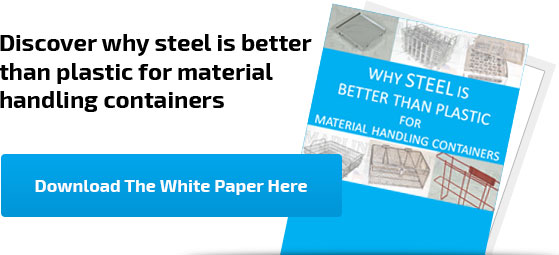 Marlin Steel’s manufacturing engineers field a variety of questions about how Marlin makes parts washing baskets. Recently, a client asked why Marlin specialized in creating custom stainless steel baskets rather than working with HDPE (High-Density Polyethylene).
Marlin Steel’s manufacturing engineers field a variety of questions about how Marlin makes parts washing baskets. Recently, a client asked why Marlin specialized in creating custom stainless steel baskets rather than working with HDPE (High-Density Polyethylene).
There are many reasons why Marlin chooses to work with steel rather than polymers such as HDPE, including:
Resistance to Impacts and Heavy Loads
While HDPE has a high strength to density ratio that makes it tough (for a polymer), the toughness of HDPE pales in comparison to most steel alloys.
Sources such as gplastics.com note that HDPE has an ultimate tensile strength of 4,600 psi. Compare this to Grade 304 stainless steel (the alloy most frequently used by Marlin), which has an ultimate tensile strength of 73,200 psi.
So, when subjected to hard impacts or put under a heavy load, HDPE will collapse well before stainless steel will.
Useful Life
Because of the higher tensile strength of steel, it will naturally last much longer through heavy use than HDPE would. However, there are more factors that affect useful life than the basket’s ability to resist physical force.
The chemical resistance of a material can make a huge difference on how long it lasts. HDPE has generally strong resistance to acids and alkalis, but can be degraded by exposure to ethers, chlorinated solvents, and sunlight. The weakness to UV light renders HDPE patently unsuited for any application involving prolonged exposure to sunlight.
Grade 304 stainless steel has excellent overall corrosion resistance when exposed to most chemicals. However, if resistance to a specific chemical is lacking, a polymer coat can always be applied to the steel to provide the benefits of both high tensile strength and corrosion resistance.
This means less time spent ordering replacements for broken baskets, and more time using the baskets to complete important manufacturing tasks.
Surface Conditioning
Plastics such as HDPE tend to absorb chemicals such as oil, grease, and even some solvents. Not only does this discolor the plastic, it can be a problem for sanitary applications. For example, if enough residue is accumulated, it could be transferred to parts during a wash process.
Steel is much less absorbent than polymer, which makes it easier to sanitize for applications that require clean conditions. Additionally, steel can be heat-sanitized without causing damage to it.
Temperature Tolerance
HDPE is not a material you want near any high-temperature applications. The melting point of HDPE is around 260 degrees Fahrenheit, which means that it will lose a significant portion of its tensile strength well before hitting that temperature.
Compare this to stainless steel, which can be used in temperatures of up to 1,600 degrees Fahrenheit without losing tensile strength.
Simply put, steel is stronger than HDPE in almost every way. The one advantage of working with HDPE is that it is a bit softer than steel, making it less likely to mar parts during a wash cycle. However, if that’s a major operational goal, it’s possible to add a polymer coating to the steel material so that you get the tensile strength of steel combined with the gentleness of the polymer.
Marlin Steel works with stainless steel because, over time, it can provide a better total cost of ownership for clients than plastic baskets while doing more to empower manufacturing efficiency.



.gif)


